#psychedelic blues film
Explore tagged Tumblr posts
Text

Record store cat, 2019
Sticker here
by purgatorie
#purgatorie#35 mm film#35mm#35 mm#film photo#35mm camera#35mm photography#film#los angeles#psychedelic blues film#35mm color film#cats of tumblr#cat#caturday#2019#burger records#records#record store#record collectors#record#vinyl records#vinyl#rock music#psychadelic#critters#record collection#lps#lp#vintage#vintage store
74 notes
·
View notes
Text

Photo that I took in May of 2020 that is the cover art for my Black Metal project, Reeking Nightshade's, debut album. You can listen to and, if you're inclined, purchase here.
Photo is of Elaine standing atop Mount Scott of the Wichita Mountains in Oklahoma. Shot with Psychedelic Blues No. 3 on a barely functioning Minolta SLR 102.
#35mm#will mecca#denton#35mm film#film photography#texas#35mm photography#expired film#expired 35mm#expired 35mm film#wichita mountians#mount scott#black metal#raw black metal#atmospheric black metal#moonworshipper records#psychedelic blues film#psych blues film#light leaks#kodak film#kodak#analog photography#filmisnotdead#filmisalive#filmisbetter#35 mm#35mm color film#35 mm film#reeking nightshade#Ukeparaave Enviavuasan
5 notes
·
View notes
Text




Mapuana
2023
Lodi, CA
#photography#35mm#film#original photographers#photographers on tumblr#film photography#filmisnotdead#35mm film#staybrokeshootfilm#kodak portra 400#portraits#musician#psychedelic blues
16 notes
·
View notes
Text


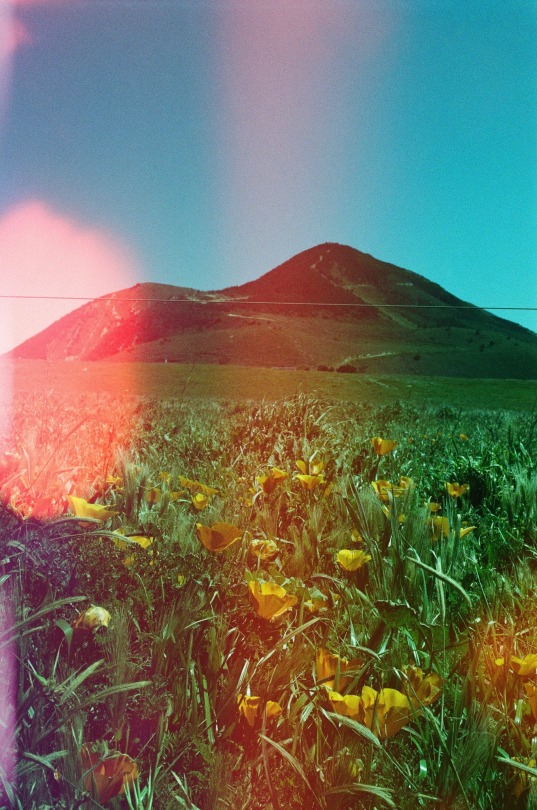
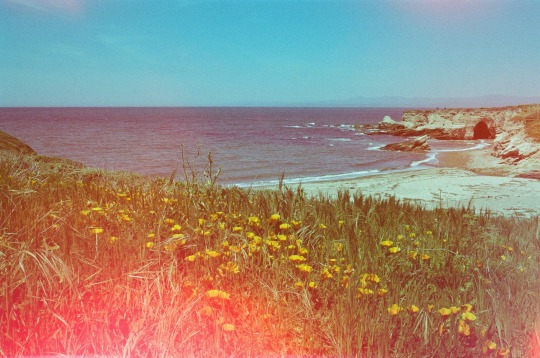

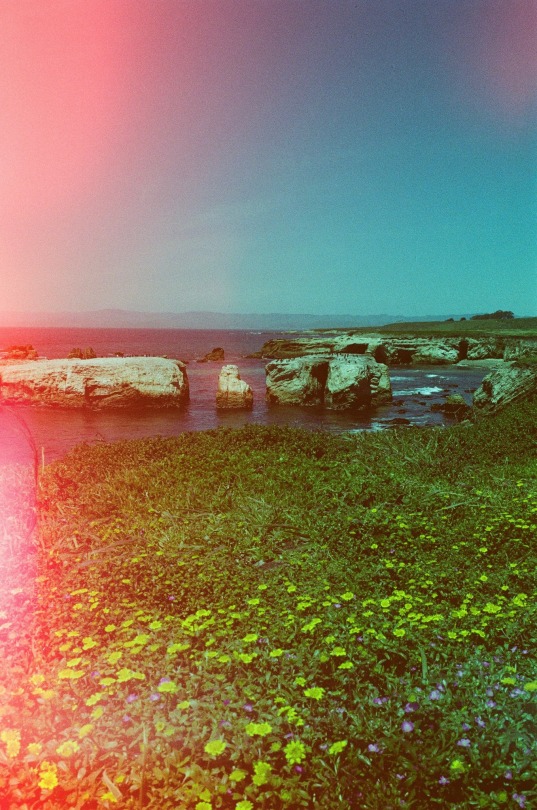
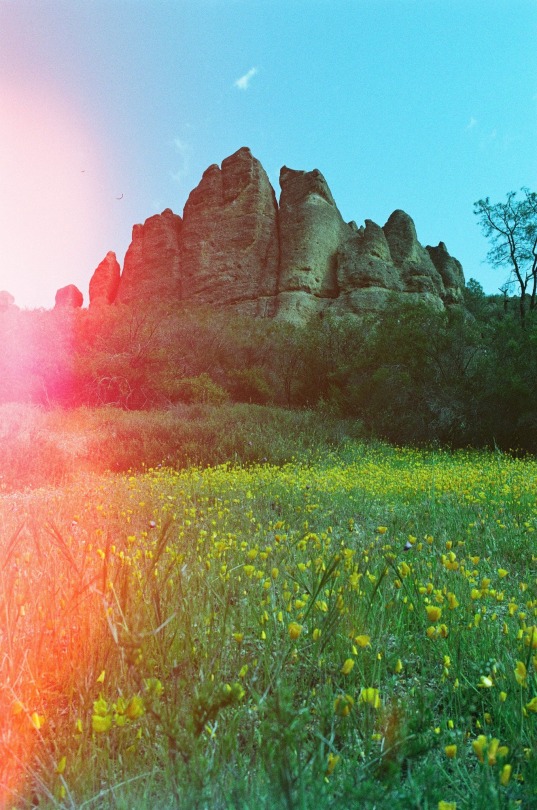

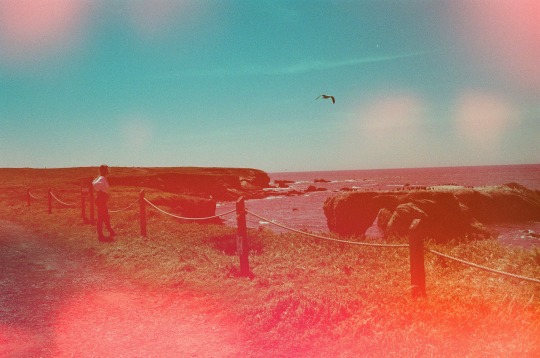
I dream of the salty sea air and the waves on the beach. Always a unique rock formation waiting to be admired.
I fantasize about the days of slow walks and fields of poppies with no where else to be.
You and I with the wind in our hair, feelin nothing but free.
#photography#beach#california#poppies#west coast#adventure#aesthetic#ocean waves#filmisnotdead#35mm#film photography#35mm film#psychedelic blues#seascape#seaside#nikonphotography#nikon film camera
99 notes
·
View notes
Text
On October 1, 1983, Blue Sunshine was screened on Elvira's Movie Macabre.





#elvira's movie macabre#blue sunshine#movies#horror#horror art#horror film#horror fan art#psychedelic film#fan art#art#horror hosts
5 notes
·
View notes
Text

wow 3 years ago Bry didn't know how much I would need this now... or maybe she did... :')
paint on film
#35mm#film photography#film forever#mixed media#painted words#soul whispers#soul messages#35mm color film#filmisnotdead#artists on tumblr#loftybliss#psychedelic blues
5 notes
·
View notes
Text
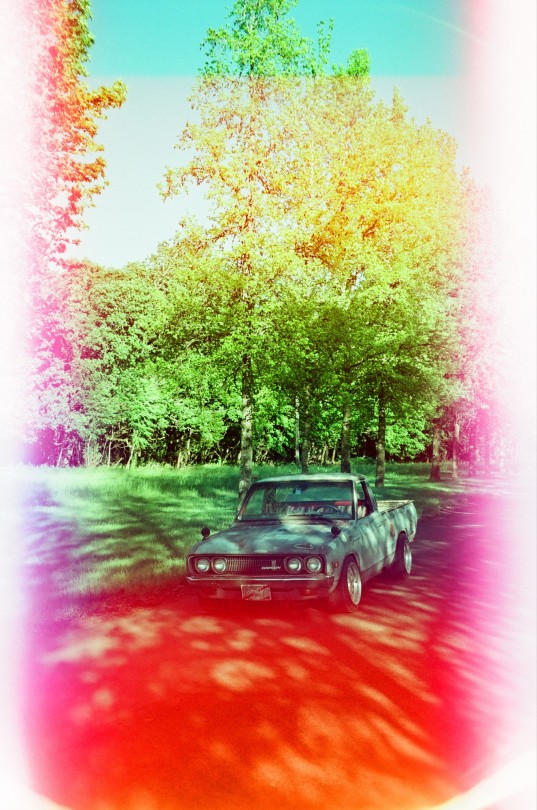
#datsun#kyusha#pnw#oregon#shakotan#nissan#cars#car photography#35mm film#620#35mm#film#film photography#psychedelic blues 5/6#psychedelic blues#olympus stylus#zoom 80
9 notes
·
View notes
Text
youtube
#favorite songs#good music#audio#music i like#youtube#music artists#musicians#country#soundcloud#music#horror#90s horror#horror art#horror comedy#horror movies#horror films#rock#80s rock#alt rock#art rock#asap rocky#rock music#black girls rock#blues rock#psychedelic rock#bocchi the rock!#folk rock#goth rock#hard rock#indie rock
1 note
·
View note
Text
Writing Notes: Fashion History

for your next poem/story (pt. 2/2)
1950s
The 1950s were a time of large cultural and social change, which was reflected in the world of fashion. The Korean War began in 1950, followed by the introduction of the color TV in 1951. And in 1954, the modern civil rights movement began.
As the suburbs became popular, family and domesticity for women became a prominent force in society. Additionally, teenagers became fashion consumers and market leaders for the first time.
Due to technological advances, new fibers such as polyester, triacetate, and spandex are introduced.
The prominent trend of the time was femininity, as shown by the prominence of Christian Dior's "New Look". Shape was emphasized by full swing skirts or narrow pencil skirts, as well as fitted bodices and a small waistline achieved with the help of petticoats and girdles. Elegant accessories and jewelry such as hats and pearls were popular at the time, and high heels were ubiquitous. Other trends included Peter Pan collars, tapered or capri pants, and the introduction of the bikini.
1960s
The Beatles led the music and fashion “British Invasion,” influencing teenagers with their Mod aesthetic.
The Civil Rights movement led to the popularity of ethnic and African-inspired garments such as dashikis and caftans.
The 1960s were marked by eclecticism, both in fashion and society. A plethora of styles were fashionable at one time, ranging from space age fashions using vinyl and synthetics, to bold prints, colors, and disposable paper dresses inspired by Pop Art.
Mod fashion appeared on the London scene, with fashion designer Mary Quant as the “high priestess” of the style, and Twiggy as its supermodel.
Boutiques, a 1960s creation, began offering designer ready-to-wear collections, while easy-care fabrics were increasingly used by the general public.
Longer hemlines were dominant with maxi skirts and granny dresses, while hot pants and mini skirts were adopted by the younger market. These shorter hemlines popularized the use of pantyhose for modesty. As the decade progressed, chemise dresses that typified the dominant straight A-line silhouette became popular. Turtleneck blouses and sweaters were common, and sleeves were usually three-quarter length. Sleeveless tops were worn after the mid 1960s.
Jacqueline Kennedy became a major fashion icon, famous for her sophisticated style, pillbox hats, and pearls. Overall, hats in general experienced a decline in use, due to the popularity of high bouffant hairstyles.
Knee high go-go boots were popular, patent was often used, and low-heeled, square-toed shoes were common.
Popular accessories included headbands, bold jewelry, and matching shoes and handbags.
1970s
During the 1970s, the eclecticism of the previous decade continued, and influences from subcultures dominated fashion.
The Vietnam War ended in 1973, and the first Earth Day was celebrated in 1974.
The hippie subculture emphasized environmental awareness and social acceptance, translating into the popularity of natural fibers and earth tones, loose garments, blue jeans, and ethnic influences in dress.
Peasant blouses and skirts and psychedelic prints were popular, as well as historic revival styles.
In the late 1970s, music styles such as glam rock, disco, and punk influenced fashion and resulted in flashy, often shocking styles.
For the most part, clothing was loose and unstructured compared to previous decades. Skirts came in a variety of lengths — mini, midi, or maxi — although the mini and maxi were the most popular.
Unisex styles in clothing became a trend and were perpetuated by Diane Keaton’s character in the 1977 film, Annie Hall.
Trousers and blue jeans were worn by women more than ever before. Designer jeans arrived on the market, resulting in the birth of “licensing” for non-fashion products. Polyester was the other preferred textile for trousers.
1980s
With the rise of new media such as MTV, the 80s fashion landscape began to shift rapidly.
The televised wedding of Prince Charles and Diana Spencer caused a fashion frenzy, with "Lady Di's" elegant hats, tailored suits, and evening dresses making her a global style icon.
The 1980s were known as the "Me" Generation, with an emphasis on logos and designer labels.
The decade also saw the rise of yuppie (young urban professionals) culture, and the introduction of the fitness craze.
In the world of high fashion, postmodernism and avant-garde fashion were vastly influential. With the introduction of yuppie culture, business attire and "power-dressing" with items like shoulder pads was a popular trend.
In light of the fitness craze, leg warmers, tights, and leotards were widely worn, and women accessorized with big hair, flashy costume jewelry, and bright heels.
In terms of undergarments, Madonna and Jean-Paul Gaultier inspired an underwear-as-outerwear trend alongside the popularity of Calvin Klein.
1990s
The 1990s reflected subcultures such as punk, goth, and grunge in fashion.
Hip-hop music became popular and as a result, urban fashion was popularized.
Unlike previous decades, the 1990s was notable for a more relaxed and casual look, as well as the introduction of technology such as cell-phones and pagers.
With the rise of globalization & technology, the fashion cycle began to speed up.
1990s style was often considered "anti-fashion," with purposefully clashing or contradictory aesthetics.
Black, minimalist styles were popular, as well as vintage and 1970s style.
Many younger people sported crop tops, cargo pants, and blue jeans, and athletic wear in daily life. In terms of shoes, high heels, wedges, sandals, platforms, and sneakers were all widely worn.
More Notes: On Fashion ⚜ More: Writing Notes & References
#writing notes#fashion#fashion history#writeblr#studyblr#spilled ink#dark academia#writing reference#light academia#creative writing#writing inspo#writing ideas#writing inspiration#literature#writers on tumblr#writing prompt#poetry#poets on tumblr#writing resources
135 notes
·
View notes
Text
SAPPHIC ARTISTS TO LISTEN TO
(instead of writing your 69th essay about how Taylor Swift is a closet lesbian)
Starting off with my holy trinity:
Rina Sawayama (she/her, bi/pan): if you follow me you're probably aware of what a huge Rina fan I am. Lots of pop and rock, with a chunk of her earlier songs being R&B. Her debut album SAWAYAMA (my favourite album of all time!!) was her major breakthrough moment as it received critical acclaim and her sophomore album Hold the Girl made her the highest charting Japanese artist in the history of the UK. Known for her musical versatility, she made her acting debut in John Wick 4. I recommend: Cherry, Frankenstein and Bad Friend
Janelle Monáe (she/they, bi/pan): pop, funk, neo-soul and psychedelic. They have an entire series of concept albums about an android named Cindy Mayweather (her ALTER EGO?!) as she commits the crime of falling in love with a human. Lots of social commentary. Her album Dirty Computer comes along with a narrative film and a book taking place in its world. She's starred in movies like Antebellum, Glass Onion and Moonlight. I recommend: Electric Lady, Django Jane and Pynk
Raveena Aurora (she/her, bi): Experimental pop, R&B and soul. Her second album Asha's Awakening is a concept album following the journey of Asha, a Punjabi space princess, as it explores Aurora's South Asian identity and past relationships. Such a beautiful and soft voice to die for. I recommend: Headaches, If Only and Kathy Left 4 Kathmandu
Moving onto some other artists I like:
Boygenius: a band comprising of three sapphic women- Phoebe Bridgers (indie darling™), Lucy Dacus and Julien Baker (the first two are bi while the third is a lesbian). Indie, folk and alternative rock. Very melancholic. I urge you to check out their individual projects too (especially Phoebe's, I love her Punisher album). I recommend: Emily I'm Sorry, Satanist and True Blue
Kelela (she/her, queer): R&G, electronic and alternative R&B. Her debut EP Hallucinogen covers the beginning, middle and end of a relationship in reverse chronological order. Her second album Raven showcases Black futuristic art, which I fuck with. I recommend: Contact, The High and Bluff
Zolita (she/her, lesbian): dark-pop, R&B and electropop. She incorporates witchcraft into her music and mvs. She literally has an EP called Sappho what more could you want? I recommend: Holy, Ashley (the sapphic Speak Now) and Bedspell
Victoria Monét (she/her, bi): pop and R&B. She's written songs for artists like Ariana Grande (7 Rings) and Chloe x Halle (Do It). Go stream her Jaguar EP you will thank me later. I recommend: Touch Me (erotic sapphic song), Cupid and Love U Better
And finally some honourable mentions (can't make this post too long now can I): mxmtoon, Michelle Zauner, Arooj Aftab, Sir Babygirl, Dodie, Chloe Moriondo, Lauren Jauregui, Baby Queen, Sara and Teagan, The Butchies, Sofya Wang and Melissa Etheridge
#god works hard but i work harder#anyways. im going to sleep this took way too much time#sapphic#lesbian#bisexual#pansexual#music#NO I AM NOT TAGGING EVERY ARTIST HERE DO YOU WANT ME TO FUCKING DIE???#or actually#rina sawayama#janelle monáe#raveena#boygenius#kelela#zolita#victoria monét#okay but i'm not tagging the honorary mentions that's way too many#music recs#anti gaylor
1K notes
·
View notes
Note
So what is happening in your Blades in the Dark Game exactly? The Midnight Runners Specifically?
[Takes a deep breath in] OK so this is gonna take a bit.
Blades in the Dark: The Midnight Runners was run by my friend colinomicon on The Lost Caravan RPG twitch channel at the start of 2024. (You can find 3 out of 4 sessions on the youtube channel, sadly the 4th is lost to time and space.) The premise of the game was the 1979 film "The Warriors".
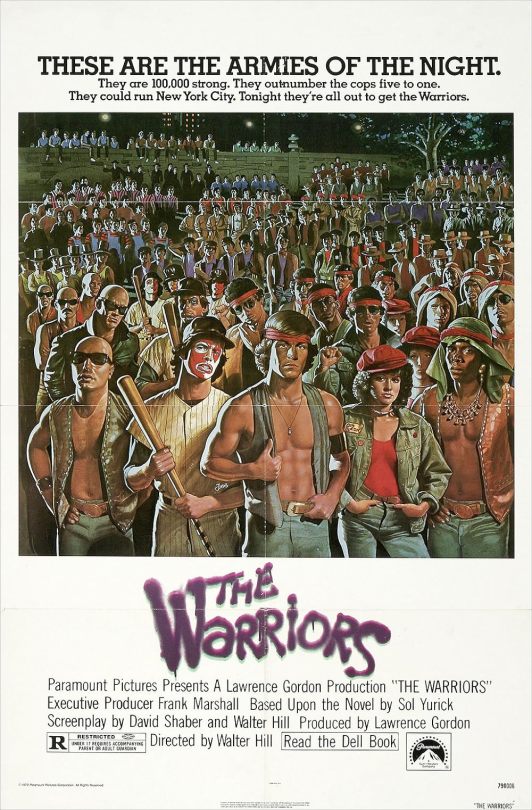
Where The Warriors leave their turf in Coney Island to take part in a meeting in uptown NY city called by the largest gang in the city. Things go south and The Warriors have to survive the night and get back to their turf whilst everyone thinks it is their fault things went wrong at the meeting. So our game followed that premise but with a bit more to it.
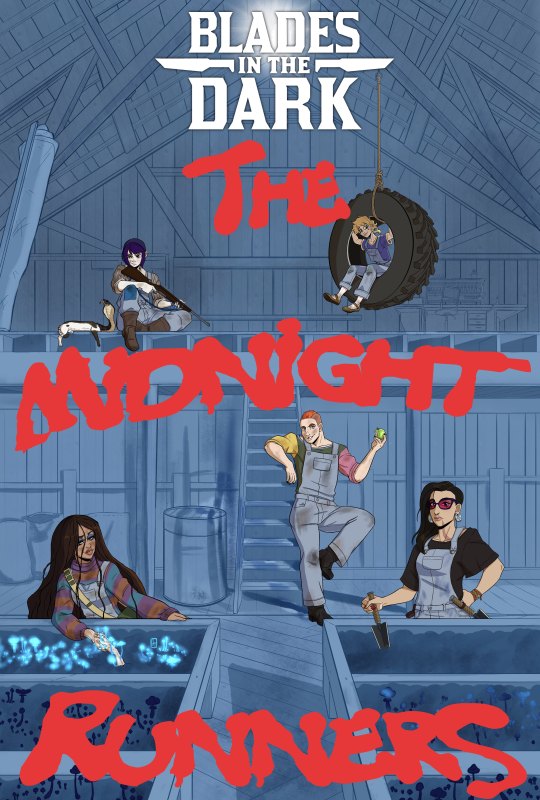
In our game The Midnight Runners is a small gang of drug producers/movers that specialize in "Blue Lips" a psychedelic mushroom that grows on corpses. It mimics the "going into the light" feeling people have in near death experiences, though untreated the shrooms cause actual death. The gang knows how to make the shrooms safe to consume and also how to make the purest high, so they corner the market on Blue Lips.
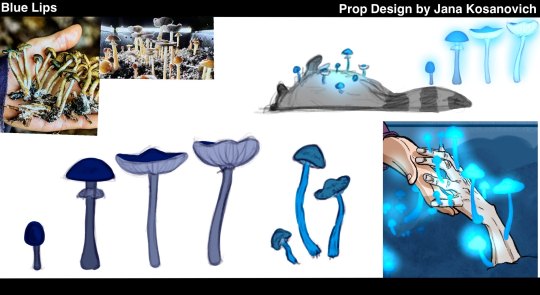
The members are (L to R)
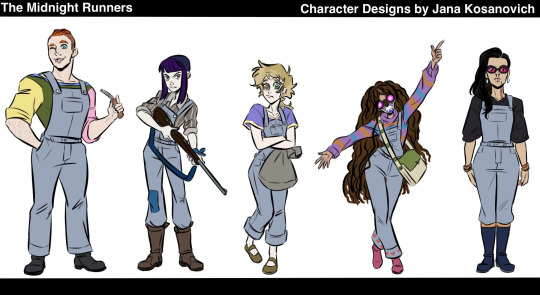
Rust: The Cutter. The muscle of the group. Loves to fight and fuck, typically in that order.
Soda Pop: The Hound. Second in command and drug tester. Drinks a lot of soda pops, like so much. There is a post about her pre episode 4.
Cricket: The Lurk. "God's favourite child", an ex Blue Lips junkie and sneak thief. Likes having a place she feels she belongs and River.
River: The Whisper. She sees dead people and talks them into moving on which makes the Blue Lips high all the better. She likes stuff... she is insane but she likes Cricket.
Dexy. The Leader. Botanist, mother figure, the best of us all. GM NPC.
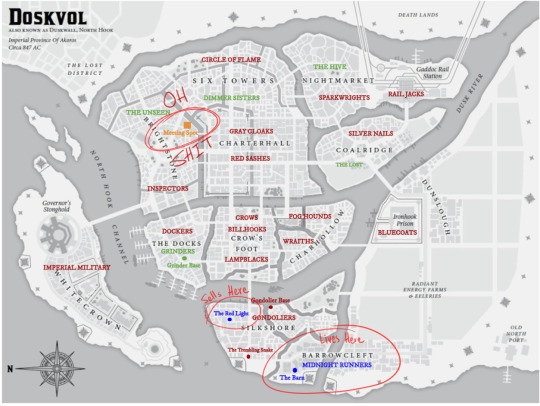
The gang got their invite to the big meeting called by The Unseen by crashing a big old fundraiser/ball at the Academy and getting everyone high as balls off Blue Lips that was added to the beef wellington and vegetarian dishes. As well as having smashed so many priceless antiquities and releasing some ghosts in the process.
There was a lot of downtime and flashbacks that happened in episodes 2 and 3 so I'd suggest checking out the videos that didn't get lost to time and space, cause I think we were entertaining and brilliant.
At the meeting (which they had to go to without any weaponry since a truce was called), all the leaders were called up to the stage to talk with the leader of The Unseen... Only for a bomb to go off. Killing a lot of the leaders, including Dexy. Dexy had been wearing a piece of pottery that served as a new calling card for the gang and that unfortunately survived the explosion and made everyone think that The Midnight Runners had set up the bomb.
Episode 4, which is sadly missing, was the gang trying to get back to Barrowcleft.
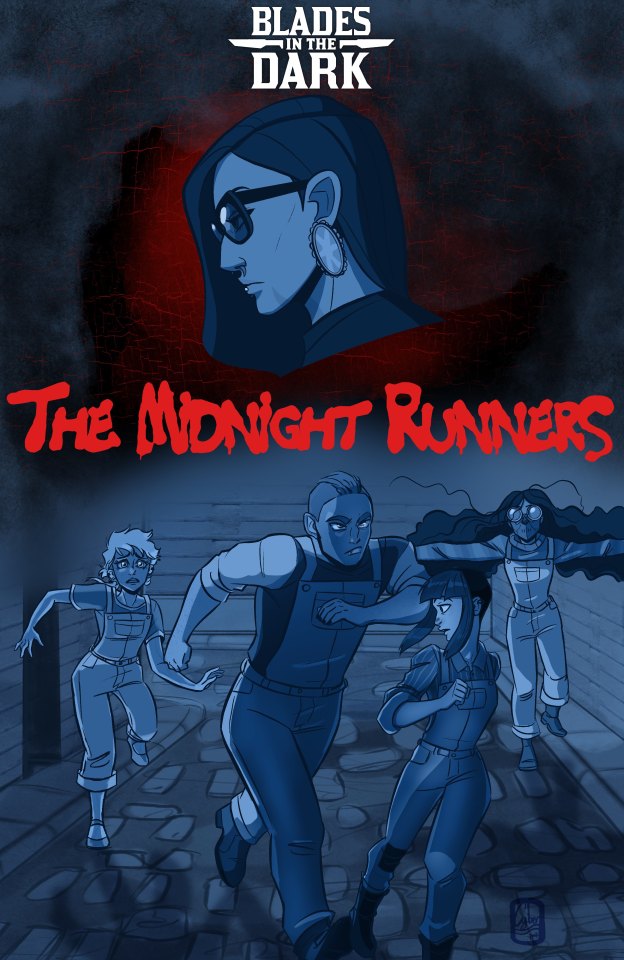
Dodging gangs and the police. Dangerously climbing under a bridge to bypass a barricade. Fighting Soda's old bounty hunter mentor who was trying to collect the bounty on them. Fighting a gang with a ghost toilet cover, River called up a useless ghost of a man that died on the toilet along with the ghost of his toilet. So Rust having no weapons armed himself with the cover from the ghost toilet and bashed a man's head in.
Getting back onto their boat to try to make it home, only for the mostly exploded leader of the Grinders, Marlo, sitting in the boat being a scary badass. Luckily talked her into not killing us all with her one good hand.
Got back to Barrowcleft only to find our hideout, the barn, on fire surrounded by cops. Decided, fuck it, we are going in live. Ends up that "Officer Muttonchops", a seemingly joke of a man, was the one that set up the bomb and pinned it on us... Soda shot him through the eye before he could get into his whole villain monologue. Everyone ran in swinging: River summoned a lightning storm, Rust punched his way through, Cricket armed herself with dynamite from some stashes, and Soda made her shots count.
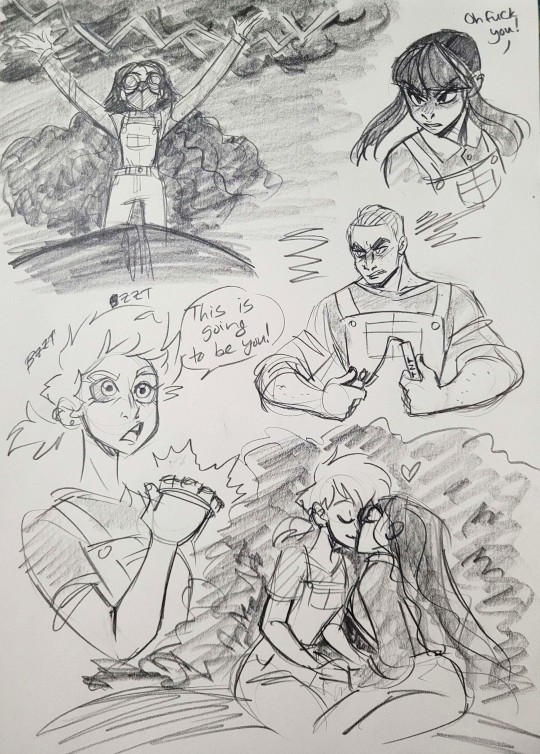
In the end The Unseen showed up and ended the conflict. Apologizing for thinking we were to blame for the death of their leader and offered us reparations. We said we'd need a new hideout and since we needed new corpses for Blue Lips, we'd be taking the cops'.
That is how it went. Hope that answers your question.
#answer#blades in the dark#blades in the dark the midnight runners#the midnight runners#ttrpg#ttrpg art
32 notes
·
View notes
Text

Malibu, 2019
sticker here
purgatorie
#psychedelic blues film#purgatorie#35 mm film#35mm#35 mm#film photo#los angeles#35mm camera#35mm color film#35mm photography#film#ocean#ocean view#waves#malibu#malibu beach#ocean waves#2019#beach
42 notes
·
View notes
Text
I hate Abstract Hip Hop African Music Afrobeats Alt-Country Alté Alternative Dance Alternative R&B Alternative Rock Alt-Pop Ambient Ambient Dub Ambient Pop Ambient Techno Americana Art Pop Art Punk Art Rock Avant-Garde Jazz Ballroom Baltimore Club Bedroom Pop Blues Boom Bap Brazilian Music Breakbeat Breakbeat Hardcore Bubblegum Bass Caribbean Music Central African Music Chamber Folk Chamber Pop Chicago Drill Chillout Chillwave Classical Music Cloud Rap Conscious Hip Hop Contemporary Folk Contemporary R&B Country Country Soul Dance Dancehall Dance-Pop Deconstructed Club Deep House Detroit Techno Disco Downtempo Dream Pop Drill Drill and Bass Drone Drum and Bass Drumless Dubstep Dub Techno East Coast Club East Coast Hip Hop Electro Electroacoustic Electronic Electronic Dance Music Electropop Emo Emo Rap Experimental Experimental Hip Hop Experimental Rock Film Soundtrack Folk Folk Rock Footwork French Hip Hop Funk Funk brasileiro Funk Rock Future Garage Gangsta Rap Garage Punk Garage Rock Ghetto House Ghettotech Glitch Glitch Hop Glitch Pop Grime Hard Bop Hardcore [EDM] Hardcore Hip Hop Hardcore [Punk] Hardcore Punk Hip Hop Hip Hop Soul Hip House Hispanic American Music Hispanic Music Horrorcore House Hyperpop Hypnagogic Pop IDM Indie Folk Indie Pop Indie Rock Indietronica Industrial Industrial & Noise Industrial Hip Hop Industrial Techno Instrumental Hip Hop Jamaican Music Jangle Pop Jazz Jazz-Funk Jazz Fusion Jazz Rap Juke Jungle Krautrock Math Pop Math Rock Memphis Rap Microhouse Midwest Emo Minimal Synth Minimal Techno Minimal Wave Modern Classical MPB Neo-Psychedelia Neo-Soul New Wave Noise Pop Noise Rock Northern American Music Nu Jazz Outsider House Plugg PluggnB Plunderphonics Political Hip Hop Pop Pop Rap Pop Rock Pop Soul Post-Bop Post-Hardcore Post-Industrial Post-Punk Post-Punk Revival Post-Rock Power Pop Progressive Breaks Progressive Electronic Progressive Pop Psychedelia Psychedelic Folk Psychedelic Pop Psychedelic Rock Psychedelic Soul Punk Punk Rock R&B Reggae Regional Music Rock Shoegaze Singer-Songwriter Slacker Rock Slowcore Smooth Soul Sophisti-Pop Soul Soul Jazz Sound Collage Soundtrack South American Music Southern African Music Southern Hip Hop Southern Soul Spiritual Jazz Spoken Word Synth Funk Synthpop Tech House Techno Traditional Folk Music Trap Trap Soul Trip Hop UK Bass UK Funky UK Garage UK Hip Hop West African Music West Coast Hip Hop Western Classical Music Wonky
80 notes
·
View notes
Text


Kate Smash 🫀
2022
#photography#35mm#film#psychedelic blues#filmisnotdead#35mm film#staybrokeshootfilm#photooftheday#photoset#film photography#california#santa cruz
3 notes
·
View notes
Note
You should infodump abt your ocs....tell me as much as possible.... (ʘᴗʘ✿)

Aww why thank you 😊💕🌈
Unfortunately I don't really have any in depth information as I either haven't developed or updated any of my babies yet but I suppose I can go ahead and represent the concepts I made for the future crew so I can dump some fun facts and random ideas that have been running around in the back of my mind about them as of late.
Info Dump and Concepts can be found below the cut!
Silver the Hedgehog

Starting with everyone's favorite psychedelic cowboy from the future -
- Is a young adult in the concept art. - In my current primary headcanon for the franchise Silver is the biological grandson of Sonic and Shadow cause canon be damed and I swear their fanonical son is the living embodiment of Silver's Daddy. (Sorry Shadilver/Sonilver fans but in this house we roll with the concept of Sil having an existential crisis after nearly erasing himself from the timeline by unknowingly attempting to kill his grandfather.) - His Dad is a Hedgehog who goes by the name of Castor. (Will be delving more into him again at a later date so I can answer all the questions over at the @sonic-fankid-showdown I missed out on once I've whipped up his ref sheet.)


- Is a certified Bi Trans Man with a preference for Men 😎👌🏳️🌈 (Currently single cause I don't really ship him with anyone these days on account of the guy being a living paradox who more than likely is related to at least one of 3 other main hedgehogs of the franchise although not confirmed. Can totally get behind Espilver and Silvaze even though I headcanon Blaze as a hardcore Lesbian now and days.)
- Though unintentional this particular iteration of Silver can telepathically communicate with someone through his mind if he has a close enough bond with that person to subconsciously form a psychic link. This often results in the recipient randomly being suddenly bombarded by his innermost thoughts and dreams which in turn can cause some scare and confusion until they realize what’s going on. Said ability also allows for Silver to read said recipients mind if given permission to do so. (It should be noted that this ability is the genetic result of his father’s ability to enter one’s dream.)
- Highly considering giving him a pink aura over his canonical blue/turquoise one for the sake of aesthetics but we’ll see which I like better once I get around to updating his design. May even give him a few stars that light up when using his powers as well. 😉
- Would LOVE to craft him his very own companion such as a Chao or a Flicky! Currently stumped on what kind of companion to give him though. 😔
Rayne the Husky

Next up we have the gal behind the blog in Sonic form herself -
- As per the case with all my current sonas, Rayne's name originates from the word Rainbow because Rainbows are a natural phenomena I've loved since I was a kid for reasons I'll save for anyone who may be interested in hearing them at a later date. Despite her names origins however the name Rayne primarily serves as a representation of her water based abilities and reflection of her radiant personality. (Fun fact! This iteration of the name Rain means Counsel/Friend! Additionally her friends call her Ray for short. This is not to be confused with Ray the Flying Squirrel.) - Her Black Knight counterpart goes by the name of Bowyn as a nod to one of the main protagonists from one of favorite childhood films, Dragonheart. (I'm not joking when I say I've adored the name Bowen since the day I first watched the movie.)
- Why a Husky? Cause they're my favorite dog breed and my good old friend @faecaptainofdreams once pointed out how I strike her as a puppy on account of my eccentrically sweet and loving nature so you can pretty much thank her for that. (Psst! You should totally drop the Captain a follow and commission her if you can! I promise it will totally be worth your while. 😉)
- If it weren't already obvious Rayne posses the power of Hydrokinesis as a result of my Zodiac Sign, the Scorpio, being heavily associated with the element of water although I'm considering expanding her abilities to be more stormy in nature once I get around to finalizing her design. Regardless of what I decide, what I can say with certainty at the very least is that she has the miraculous ability to heal others though it only really works on physical injuries and even then it's not exactly full proof but it has been known to be quite the life savor none the less. (Because of this I can easily imagine Rayne becoming Blaze's rival if they were to ever meet. I have been looking into giving her an IDW counterpart for people to use in more canon material if they so wish so perhaps I'll explore the concept more for that universe if and when I decide to do so? Should probably catch up on the comics first though as it's been a hot minute since I've last read them.)
- Not only is she taller than Silver as a result of Dogs naturally being bigger than Hedgehogs but they're also older than him by a few months which realistically checks out as I was born 6 years before 06 came out. (It should be noted that regardless of the context the two will forever be close in age to serve as a reflection of how much I've grown up alongside the Sonic franchise and call back upon some fond childhood memories of mine that just happen to be closely tied with Silver's character.)


- Identifies as a Bi Demisexual with a preference for Woman/Enbies thus making her and Silver Bi Buddies 😎💖💜💙🤘 (Is also a single pringle at this time to reflect my current relationship status but I'm always open to giving her a partner in the future should I ever stumble upon the Shadow to my Sonic to ship my sona with theirs otherwise this canine ain't need nobody to be happy!)
- The initial name for her Super form is Harbinger, a title I was inspired to take on after a dream I had a couple years ago where I had to save the embodiment of death itself from being erased from existence, but this name may be retooled to use for a potential powered up form caused by the chaos energy her companion, Rook, emits due to their association with death. (Stay tuned as I will be covering them here shortly!)
- Although I have yet to learn how to play myself, jamming out to her favorite rock songs on the guitar is one of Rayne's favorite past times! (Speaking of rock songs I like to think that she has merch from Sonic and Shadow's days as rockstars! Considering they're his grandfathers Silver can't help but raise an eyebrow whenever she parades around the base in Sonadow attire.)
- Enjoys taking a good photoshoot of/with her loved ones so that she'll always have physical memento of her memories with them to hold onto even long after they're gone.
- Often refers to Silver as a Cowboy because he sounds just like one to them. (No really! I swear Pete Capella Silver sounds like a Cowboy especially in the Adventure Tours storyline from Mario & Sonic at the Vancouver Olympic games for the DS which just so happens to by my initial introduction to the character as opposed to 06 as I wouldn't be introduced to the game til 7th Grade.)
Rook the Reaping

And last but not least the spook birb with quite the dapper plumage -
- Thanks to my previously fore mentioned friend, I was inspired to create Rook after she suggested I take the symbolism behind the Robin for myself upon coming across a striking species hailing all the way from Australia simply known as the Scarlet Robin. That and I was pretty obsessed with Flickies at the time and figured it'd be fun if my sona had a Flicky companion considering how underrated they are. (Did you know? Robins share a lot of symbolism with the Scorpio as both entities are often associated with Death, Transformation, and New Beginnings.)


- Rook was chosen as a namesake as I felt the name's meaning, being one with the dark hair and raucous voice, suited what I had in mind for their personality pretty well. (Funnily enough Rook just so happens to be the name of a type of Corvid. It's also well known as a Chess piece lol)
- In Black Knight Rook is a Dragon of the Wyvern variety whom I've yet to come up with a proper name for although considering Bowyn's name is a nod to Bowen perhaps their Black Knight counterpart should serve as a nod to Draco? That would make the most sense.🤔
- Their species is referred to as the Reaping because they were initially a sub species of the Flicky with enough built in Chaos Energy to transform into living weapons thus giving them an association with death although I’m considering going ahead and making them their own thing both within and possibly outside of the Sonic universe.
- That’s right baby!! Rook can low key go Soul Eater mode and transform into a literal Bident which I chose due to the weapons association with the planet Pluto which just so happens to be one of Scorpios ruling planets next too Mars. (Pluto is the planet I align with more personally if it weren’t already obvious and YES I CONSIDER PLUTO TO BE A PLANET NOW BITE ME!! 😤)
- Coming back to my earlier point on making them their own thing but I’m looking at giving Rook’s species more Corvid like anatomy and an elongated tail not too unlike a lions but with feathers on the end of it to further differentiate them from the Flickies who are more tropical like with Parakeet/Parot traits in my mind.
- Rook doesn’t really have a defined gender so I typically use They/Them pronouns for Them. Because of this I’m looking at making the Reapings more androgynous in nature. Furthermore Rook may be getting a Winter Coat based off of the Female Scarlet Robin which would really supplement my previous idea.
- Sadly as a result of their uncanny abilities, Reapings are often poached and smuggled across the planet to be used as mere objects in war and criminal activity often leading to a life of abuse for these poor magnificent creatures that has caused a sharp decline in numbers of the species throughout the years. Unfortunately Rook was one of many who fell victim to such illegal trades and would be put through the worst hell imaginable up until the night they were miraculously rescued by Rayne who just happened to be in close enough proximity to hear their mangled cries thus causing a chain of events that would lead them to Silver and in turn ignite the beginning of a beautiful friendship between the three of them.
- This traumatic experience will understandably cause them to act pretty hostile towards the two Gaian’s at first, often leaving behind some nasty scars, but after enough time, care, and patience Rook will slowly warm up to the pair and grow close enough with Rayne in particularly to allow her to call upon their weapon form when needed however out of respect and just being more pacifistic leaning in nature she only ever calls upon them as a last resort.
- Has a hauntingly beautiful voice and can often be found singing alongside Rayne during one of her jam sessions, creating a harmony that really walks a fine line between radiant and eerie.
- Is pretty mischievous in nature and is known for giving folks quite the jump scare especially on Halloween, one holiday they LOVE to celebrate alongside Rayne. (Would like to get around to dressing them up as Vash and the Punisher from Trigun respectively.)
- Probably has a skull & bones collection sitting around somewhere that never fails to creep Ray out. Not to worry though! The pile usually consists of fragments from other animals of a relatively small stature as well as the occasional knick knack or two.
- Their particular species was used during the creation of Project Shadow in my primary headcannon.
Ok this turned out to be a whole lot longer than I originally anticipated so hopefully this will suffice otherwise feel free too shoot any additional questions my way and I'll be sure to answer them to the best of my ability after Valentine's Day! Btw I've yet to come up with a good team name for the three so if anyone has any suggestions for a good teammate as well as the perfect species to use for an additional please feel free to send them my way! Oh and should any of ya'll decide to draw the crew on your own time please be sure to let me know as I plan to update their designs at some point this year and would like to have a variation of any work I receive of their conceptual designs in near future featuring their finalized designs. Thank You.
#Rainburst Studios#Take a Rayne Check#Way Past Cool#Sonic the Hedgehog#Silver the Hedgehog#Castor the Hedgehog#Silver#Castor#Hedgehogs#Rayne the Husky#Rayne#Huskies#Rook the Reaping#Rook#Reapings#Flickies#Birds#STH#Sonic Fanart#Sonic Sona#Fursona#Sonic OC's#Sonic FC's#Fanart#Conceptual Designs#Sonas#OC's#FC's#Asks#Inquiries
17 notes
·
View notes
Text
On May 11, 1979, Blue Sunshine debuted in West Germany.

Here's some new art inspired by the psychedelic cult classic !
#blue sunshine#jeff lieberman#psychedelic thriller#psychedelic film#hippie movies#drug movies#1970s#70s sci fi art#70s science fiction#tcm underground#horror scifi#science fiction#grindhouse#cult cinema#scifi horror#movie art#art#drawing#movie history#pop art#modern art#pop surrealism#cult movies#portrait#cult film#west germany
1 note
·
View note